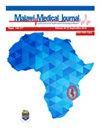Anopheles funestus sensu stricto Giles (Diptera:Culicidae) bites after sunrise at two rural villages in northern Malawi and its implications for malaria vector control
IF 0.8
4区 医学
Q4 PUBLIC, ENVIRONMENTAL & OCCUPATIONAL HEALTH
引用次数: 0
Abstract
Introduction Malawi has scaled up distribution and use of LLINs but their effectiveness depends on vector behaviour. This study reports information on where and when peak biting takes place by Anopheles vectors at two study sites in northern Malawi. MethodsThe study was carried out at a single village each in Nkhata Bay and Karonga districts, northern Malawi. Monthly, three teams of four people each sampled mosquitoes using Human Landing Collections (HLCs) from 6.00 pm to 6.00 am. Mosquitoes were counted and identified by PCR. Plasmodium falciparum sporozoites were detected by ELISA and an entomological inoculation rate was estimated. ResultsA total of 4,668 and 2,079 mosquitoes were sampled in Nkhata Bay and Karonga districts respectively. An. funestus s.s was common (91.3%; n = 2,611) in Nkhata Bay while An. arabiensis was common (96.9%; n = 706) in Karonga. Pf sporozoite rates varied from 0.8% (4/484) to 3.3% (51/1558). Individuals in Nkhata Bay received more bites (approx. 200 bites/ person/ night) compared to Karonga (approx. 50 bites/ person/ night). An. funestus was more likely to bite indoors (p=0.002) while An. arabiensis was (p=0.05) more likely to bite outdoors. Furthermore, An. funestus peak biting was in the early morning hours from 4:00 am (approx. 331 and 177 bites/ person/ night indoors and outdoors respectively) and remained high till 6:00 am. An. arabiensis peak biting (approx. 63 and 62 bites/ person/ night indoors and outdoors respectively) was around mid-night (12:00). An EIR of 108.4 infective bites/ person/ year was estimated for Nkhata Bay compared to 9.1 infective bites/ person/ year for Karonga.Conclusion An. funestus s.s. had a considerable Pf sporozite infection rate and EIR. The shift in biting behaviour shown by this species poses a challenge to malaria control. Further studies are required to understand the biting behaviour of Anopheles vectors in Malawi.马拉维北部两个乡村日出后蚊虫叮咬(双翅目:库蚊科)及其对疟疾媒介控制的影响
马拉维扩大了低剂量杀虫剂的分发和使用,但其有效性取决于病媒的行为。本研究报告了马拉维北部两个研究地点按蚊媒介叮咬高峰发生的地点和时间的信息。方法本研究在马拉维北部Nkhata湾和Karonga区各一个村庄进行。每个月,从下午6点至早上6点,使用人类登陆采集(hlc)对三组四人的蚊子进行取样。采用PCR法对蚊虫进行计数和鉴定。采用酶联免疫吸附法检测恶性疟原虫孢子体,并估计昆虫学接种率。结果在Nkhata湾和Karonga区分别捕获蚊虫4668只和2079只。一个。Funestus s.s常见(91.3%);n = 2611)。Arabiensis较为常见(96.9%);n = 706)。Pf孢子率为0.8%(4/484)~ 3.3%(51/1558)。恩卡塔湾的个体被咬的次数较多(约为。200人/人/夜),而卡隆加(大约200人/夜)。50口/人/夜)。一个。家兔在室内更容易咬人(p=0.002);Arabiensis (p=0.05)更倾向于户外咬伤。此外,一个。狐蝠的叮咬高峰出现在凌晨4点(约5点)。在室内和室外分别为331和177只/人/夜),并一直保持到早上6点。一个。Arabiensis峰值咬人(约;室内和室外分别为63和62只/人/夜),在午夜(12:00)左右。Nkhata湾的EIR估计为108.4人/年,而Karonga湾的EIR为9.1人/年。一个结论。真菌孢子虫感染率和EIR均较高。该物种叮咬行为的转变对疟疾控制构成了挑战。需要进一步研究以了解马拉维按蚊媒介的叮咬行为。
本文章由计算机程序翻译,如有差异,请以英文原文为准。
求助全文
约1分钟内获得全文
求助全文
来源期刊

Malawi Medical Journal
Medicine-General Medicine
CiteScore
1.50
自引率
0.00%
发文量
27
审稿时长
>12 weeks
期刊介绍:
Driven and guided by the priorities articulated in the Malawi National Health Research Agenda, the Malawi Medical Journal publishes original research, short reports, case reports, viewpoints, insightful editorials and commentaries that are of high quality, informative and applicable to the Malawian and sub-Saharan Africa regions. Our particular interest is to publish evidence-based research that impacts and informs national health policies and medical practice in Malawi and the broader region.
Topics covered in the journal include, but are not limited to:
- Communicable diseases (HIV and AIDS, Malaria, TB, etc.)
- Non-communicable diseases (Cardiovascular diseases, cancer, diabetes, etc.)
- Sexual and Reproductive Health (Adolescent health, education, pregnancy and abortion, STDs and HIV and AIDS, etc.)
- Mental health
- Environmental health
- Nutrition
- Health systems and health policy (Leadership, ethics, and governance)
- Community systems strengthening research
- Injury, trauma, and surgical disorders
 求助内容:
求助内容: 应助结果提醒方式:
应助结果提醒方式:


